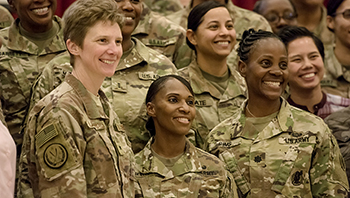 Female veterans with diagnoses of post-traumatic stress disorder, traumatic brain injury, and depression may be at increased risk of developing dementia than women without those diagnoses. Photo credit: U.S. Army Spc. Joseph Black
Female veterans with diagnoses of post-traumatic stress disorder, traumatic brain injury, and depression may be at increased risk of developing dementia than women without those diagnoses. Photo credit: U.S. Army Spc. Joseph Black
Impacts on Readiness
“It’s key to focus on preventative efforts, preventative medicine, those self-help things that people can do to try to get ahead of it before it becomes an issue, impacts readiness, and so that it has less of an impact on the strain on our health care resources available to veterans and military members,” Trahan said.
“Recommended preventative strategies include a healthy diet, exercise, routine health care, those kinds of things,” she added, emphasizing they’re the same for men and women.
“Honestly, if it's good for your body, it's good for your brain,” she said.
For Kiel, a healthy diet implies changing to a predominantly whole plant foods diet more vegetables, fruits, whole grains, legumes, nuts, and seeds, while minimizing processed foods and eliminating red and processed meats.
She agreed that preventive strategies, “can not only improve our individual readiness but also significantly protect us from negative effects of stressors—such as injury and illness—and aid in recovery as well as minimize the risk of developing future chronic diseases, including Alzheimer’s disease.”
Promoting Brain Health
Trahan explained improving your sleep is key to brain health.
She noted additional research shows “that people who have prolonged sleep problems are also at higher risk for developing dementia.”
Kiel explained that during sleep, “our brains use that time to clean up the trash that has accumulated while we’re awake. If we don’t get adequate restful sleep, those harmful toxins remain and accumulate over time in the brain. The buildup of toxic proteins has been linked to Alzheimer’s and dementia.”
Since “sleep is a challenge in the military, just due to the nature of our job and deployments, practicing healthy sleep habits and trying to get an adequate amount of sleep is something else that people can do,” to promote brain health, said Trahan.
She added it’s important to take on activities that activate the brain. “Make sure you do things that are cognitively stimulating,” she said, like staying engaged in social or academic activities with a goal of learning something new.
“Constantly doing something that keeps your brain active helps keep your brain young,” she said.
Some of these activities can include crossword puzzles, playing a musical instrument, or learning a new language to keep your brain active, challenged, and engaged. However, if you’re already good at those things, it’s time to challenge yourself to do something new, say experts.
More Diverse and Inclusive Research
“There are lots of different correlations to the development of dementia,” said Trahan. “We need to do more research; we need to learn more about those. And as part of that research, it’s really important to make sure we are including women.”
She said that some of the limitations and the reasons there are so many unknowns is because the research is not including diverse populations.
In the case of women, “we just don't know enough about why women are at increased risk,” yet much of the available research shows “some pretty big discrepancies in terms of the sample population, or that the study population is conducted primarily on men,” Trahan said.
As such, recruiting women to be a part of the research is especially important.
DOD Efforts
The DOD has a variety of resources on TBIs, including fact sheets, podcasts, and more.
In June 2022, DOD put in place the Warfighter Brain Health Initiative, a joint effort between operational and medical communities to better address the brain health needs of service members, their families, line leaders, commanders, and their communities at large.
“The strategy and action plan addresses brain exposures, to include blast exposures, TBl, and long term or late effects of TBl, with the goal of optimizing brain health and countering TBI,” said the memorandum Deputy Secretary of Defense Kathleen Hicks and Vice Chairman of the Joint Chiefs of Staff Christopher W. Grady signed to implement the initiative.
“Our goal must be to ensure our warfighters are performing at optimized capacity and if exposed or injured by a known or emerging hazard, we return our warfighters to full health to include their brain health to maximize each individual's quality of life,” they said in the strategy and action plan.
The initiative aims to:
- Optimize cognitive and physical performance
- Identify, monitor, and mitigate brain exposures
- Prevent, recognize, and minimize the effects of TBI
- Reduce or eliminate long-term and late effects
- Advance warfighter brain health science
It also emphasizes good sleep as a critical health element.
“We are emphasizing sleep quite a bit in the Comprehensive Strategy and Action Plan for Warfighter Brain Health,” said Dr. David Brody, chief science and innovation officer at the Center for Neuroscience and Regenerative Medicine of the Uniformed Services University of the Health Sciences, in Bethesda, Maryland.
"Across the DOD, including USU, Walter Reed Army Institute of Research, and many other sites, we are doing many research studies to learn how to better treat sleep problems that occur in the military. Good, quality sleep is key," he said.
For more information on brain health, memory loss, and other markers of dementia, talk to your health care provider.